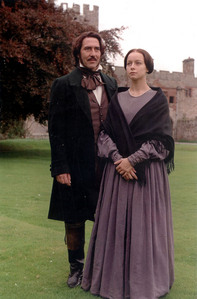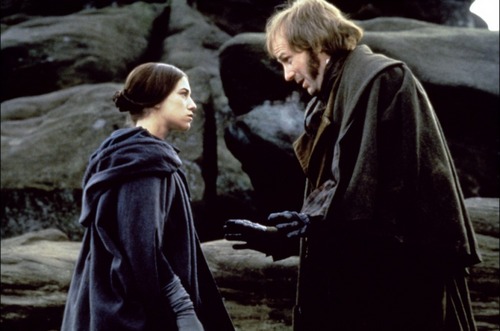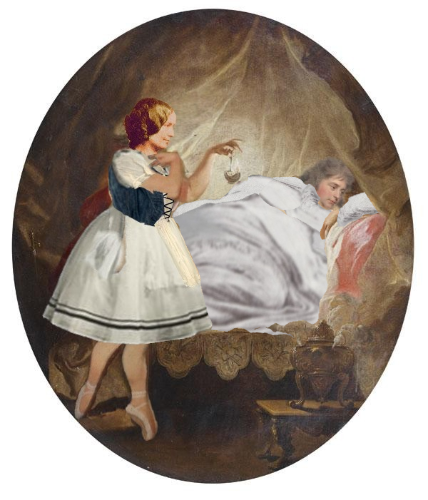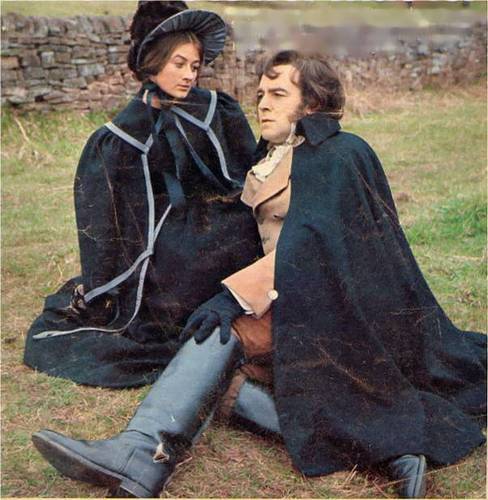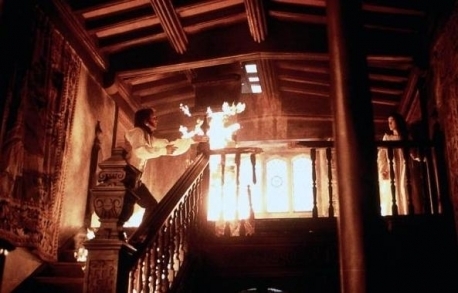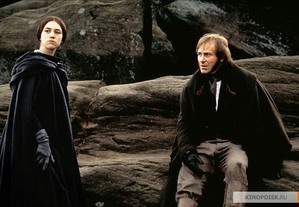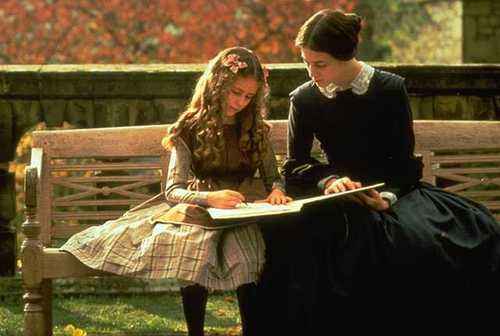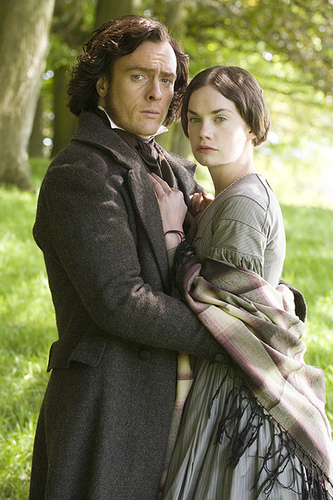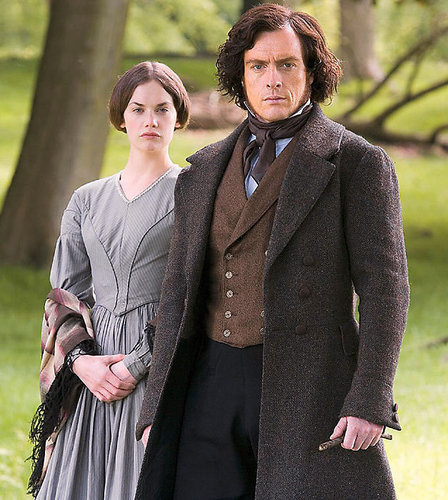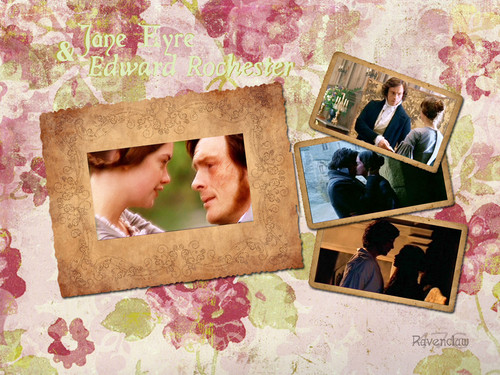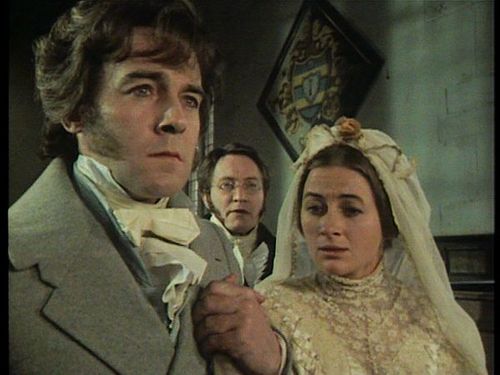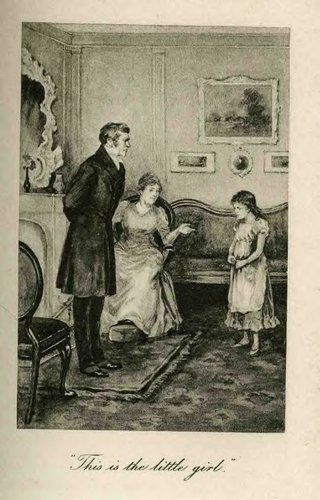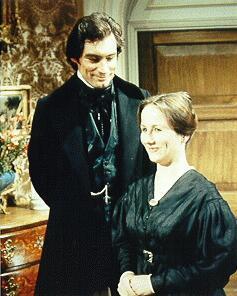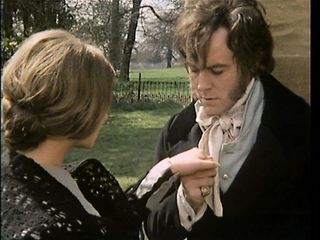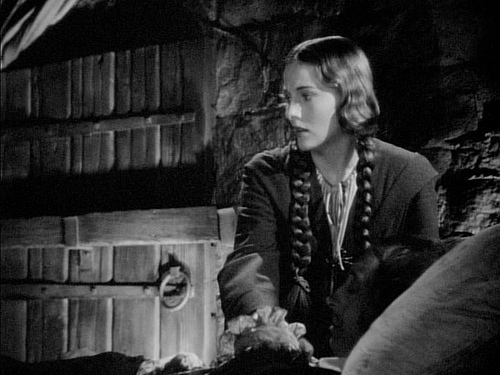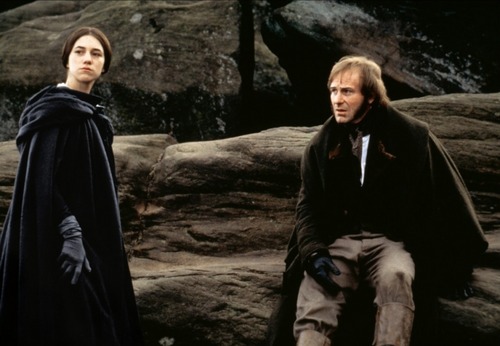"JANE EYRE" (1973) Review
When I began this article, it occurred to me that I was about to embark upon the review of the sixth adaptation I have seen of Charlotte Brontë's 1847 novel. I have now seen six adaptations of "Jane Eyre" and plan to watch at least one or two more. Meanwhile, I would like to discuss my views on the 1973 television adaptation.
For the umpteenth time, "JANE EYRE" told the story of a young English girl, who is forced to live with her unlikable aunt-by-marriage and equally unlikable cousins. After a clash with her Cousin John Reed, Jane Eyre is sent to Lowood Institution for girls. Jane spends eight years as a student and two as a teacher at Lowood, until she is able to acquire a position as governess at a Yorkshire estate called Thornfield Hall. Jane discovers that her charge is a young French girl named Adele Varens, who happens to be the ward of Jane's employer and Thornfield's owner, Edward Rochester. Before she knows it, Jane finds herself falling in love with Mr. Rochester. But the path toward romantic happiness proves to be littered with pitfalls.
After watching "JANE EYRE" . . . or least this version, I hit the Web to learn about the prevailing view toward the 1973 miniseries. I got the impression that a number of Brontë fans seemed to regard it as the best version of the 1847 novel. I can honestly say that I do not agree with this particular view. Mind you, the miniseries seemed to be a solid adaptation. Screenwriter Robin Chapman and director Joan Craft managed to translate Brontë's tale to the screen without too many drastic changes. Yes, there are one or two changes that I found questionable. But I will get to them later. More importantly, due to the entire production being stretch out over the course of five episode, I thought it seemed well balanced.
I was surprised to see that "JANE EYRE" was set during the decade of the 1830s. It proved to be the second (or should I say first) adaptation to be set in that period. The 1983 television adaptation was also set during the 1830s. Did this bother me? No. After all, Brontë's novel was actual set during the reign of King George III (1760-1820) and I have yet to stumble across an adaptation from this period. Both this production and the 1983 version do come close. But since "Jane Eyre" is not a historical fiction novel like . . . "Vanity Fair", I see no reason why any movie or television production has to be set during the time period indicated in the story.
The movie also featured some solid performances. I was surprised to see Jean Harvey in the role of Jane's Aunt Reed. The actress would go on to appear in the 1983 adaptation of the novel as Rochester's housekeeper, Mrs. Fairfax. As for her portrayal of Aunt Reed, I thought Harvey did a solid job, even if I found her slightly theatrical at times. Geoffrey Whitehead gave an excellent performance as Jane's later benefactor and cousin, St. John Rivers. However, I had the oddest feeling that Whitehead was slightly too old for the role, despite being only 33 to 34 years old at the time. Perhaps he just seemed slightly older. The 1973 miniseries would prove to be the first time Edward de Souza portrayed the mysterious Richard Mason. He would later go on to repeat the role in Franco Zeffirelli's 1996 adaptation. Personally, I feel he was more suited for the role in this adaptation and his excellent performance conveyed this. I do not know exactly what to say about Brenda Kempner's portrayal of Bertha Mason. To be honest, I found her performance to be something of a cliché of a mentally ill woman. For me, the best performance in the entire miniseries came from Stephanie Beachum, who portrayed Jane's potential rival, the haughty and elegant Blanche Ingram. I do not think I have ever come across any actress who portrayed Blanche as both "haughty" and lively at the same time. Beachum did an excellent job at portraying Blanche as a likable, yet off-putting and arrogant woman.
Many fans of the novel do not seem particularly impressed by Sorcha Cusack's portrayal of the title character. A good number of them have accused the actress of being unable to convey more than a handful of expressions. And they have accused her of being too old for the role at the ripe age of 24. Personally . . . I disagree with them. I do not regard Cusack's performance as one of the best portrayals of Jane Eyre. But I thought she did a pretty damn good job, considering this was her debut as an actress. As for her "limited number of expressions", I tend to regard this accusation as a bit exaggerated. Yes, I found her performance in the scenes featuring Jane's early time at Thornfield a bit too monotone. But I feel that she really got into the role, as the production proceeded. On the other hand, many of these fans regard Michael Jayston's portrayal of Edward Rochester as the best. Again, I disagree. I am not saying there was something wrong with his performance. I found it more than satisfying. But I found it difficult to spot anything unique about his portrayal, in compare to the other actors who had portrayed the role before and after him. There were a few moments when his performance strayed dangerously in hamminess. Also, I found his makeup a bit distracting, especially the . . . uh, "guyliner".
The production values for "JANE EYRE" seemed solid. I felt a little disappointed that interior shots seemed to dominate the production, despite the exterior scenes of Renishaw Hall, which served as Thornfield. Some might argue that BBC dramas of the 1970s and 1980s were probably limited by budget. Perhaps so, but I have encountered other costumed productions of that period that have used more exterior shots. I had no problem with Roger Reece's costume designs. But aside from the outstanding costumes for Stephanie Beacham, there were times when most of the costumes looked as if they came from a warehouse.
Earlier, I had commented on the minimal number of drastic changes to Brontë's novel. I am willing to tolerate changes in the translation from novel to television/movie, if they were well done. Some of the changes did not bother me - namely Bessie's visit to Jane at Lowood and the quarrel between Eliza and Georgiana Reed, during Jane's visit at Gateshead Hall. But there were changes and omissions I noticed that did not exactly impress me. I was disappointed that the miniseries did not feature Jane's revelation to Mrs. Fairfax about her engagement to Mr. Rochester. I was also disappointed that "JANE EYRE" did not feature Jane begging in a village before her meeting with the Rivers family. Actually, many other adaptations have failed to feature this sequence as well . . . much to my disappointment. And I was a little put off by one scene in which Mr. Rochester tried to prevent Jane from leaving Thornfield following the aborted wedding ceremony with over emotional kisses on the latter's lips. Not face . . . but lips. I also did not care for the invented scenes that included a pair of doctors telling Reverend Brocklehurst that he was responsible for the typhus outbreak at Lowood. What was the point in adding this scene? And what was the point in adding a scene in which two society ladies discussed John Reed during a visit Thornfield?
Overall, "JANE EYRE" proved to be a solid adaptation of Charlotte Brontë's novel, thanks to director Joan Craft and screenwriter Robin Chapman. Everything about this production struck me as "solid", including the performances from a cast led by Sorcha Cusack and Michael Jayston. Only Stephanie Beachum's portrayal of Blanche Ingram stood out for me. The production values struck me as a bit pedestrian. And I was not that thrilled by a few omissions and invented scenes by Chapman. But in the end, I liked the miniseries. I did not love it, but I liked it.
When I began this article, it occurred to me that I was about to embark upon the review of the sixth adaptation I have seen of Charlotte Brontë's 1847 novel. I have now seen six adaptations of "Jane Eyre" and plan to watch at least one or two more. Meanwhile, I would like to discuss my views on the 1973 television adaptation.
For the umpteenth time, "JANE EYRE" told the story of a young English girl, who is forced to live with her unlikable aunt-by-marriage and equally unlikable cousins. After a clash with her Cousin John Reed, Jane Eyre is sent to Lowood Institution for girls. Jane spends eight years as a student and two as a teacher at Lowood, until she is able to acquire a position as governess at a Yorkshire estate called Thornfield Hall. Jane discovers that her charge is a young French girl named Adele Varens, who happens to be the ward of Jane's employer and Thornfield's owner, Edward Rochester. Before she knows it, Jane finds herself falling in love with Mr. Rochester. But the path toward romantic happiness proves to be littered with pitfalls.
After watching "JANE EYRE" . . . or least this version, I hit the Web to learn about the prevailing view toward the 1973 miniseries. I got the impression that a number of Brontë fans seemed to regard it as the best version of the 1847 novel. I can honestly say that I do not agree with this particular view. Mind you, the miniseries seemed to be a solid adaptation. Screenwriter Robin Chapman and director Joan Craft managed to translate Brontë's tale to the screen without too many drastic changes. Yes, there are one or two changes that I found questionable. But I will get to them later. More importantly, due to the entire production being stretch out over the course of five episode, I thought it seemed well balanced.
I was surprised to see that "JANE EYRE" was set during the decade of the 1830s. It proved to be the second (or should I say first) adaptation to be set in that period. The 1983 television adaptation was also set during the 1830s. Did this bother me? No. After all, Brontë's novel was actual set during the reign of King George III (1760-1820) and I have yet to stumble across an adaptation from this period. Both this production and the 1983 version do come close. But since "Jane Eyre" is not a historical fiction novel like . . . "Vanity Fair", I see no reason why any movie or television production has to be set during the time period indicated in the story.
The movie also featured some solid performances. I was surprised to see Jean Harvey in the role of Jane's Aunt Reed. The actress would go on to appear in the 1983 adaptation of the novel as Rochester's housekeeper, Mrs. Fairfax. As for her portrayal of Aunt Reed, I thought Harvey did a solid job, even if I found her slightly theatrical at times. Geoffrey Whitehead gave an excellent performance as Jane's later benefactor and cousin, St. John Rivers. However, I had the oddest feeling that Whitehead was slightly too old for the role, despite being only 33 to 34 years old at the time. Perhaps he just seemed slightly older. The 1973 miniseries would prove to be the first time Edward de Souza portrayed the mysterious Richard Mason. He would later go on to repeat the role in Franco Zeffirelli's 1996 adaptation. Personally, I feel he was more suited for the role in this adaptation and his excellent performance conveyed this. I do not know exactly what to say about Brenda Kempner's portrayal of Bertha Mason. To be honest, I found her performance to be something of a cliché of a mentally ill woman. For me, the best performance in the entire miniseries came from Stephanie Beachum, who portrayed Jane's potential rival, the haughty and elegant Blanche Ingram. I do not think I have ever come across any actress who portrayed Blanche as both "haughty" and lively at the same time. Beachum did an excellent job at portraying Blanche as a likable, yet off-putting and arrogant woman.
Many fans of the novel do not seem particularly impressed by Sorcha Cusack's portrayal of the title character. A good number of them have accused the actress of being unable to convey more than a handful of expressions. And they have accused her of being too old for the role at the ripe age of 24. Personally . . . I disagree with them. I do not regard Cusack's performance as one of the best portrayals of Jane Eyre. But I thought she did a pretty damn good job, considering this was her debut as an actress. As for her "limited number of expressions", I tend to regard this accusation as a bit exaggerated. Yes, I found her performance in the scenes featuring Jane's early time at Thornfield a bit too monotone. But I feel that she really got into the role, as the production proceeded. On the other hand, many of these fans regard Michael Jayston's portrayal of Edward Rochester as the best. Again, I disagree. I am not saying there was something wrong with his performance. I found it more than satisfying. But I found it difficult to spot anything unique about his portrayal, in compare to the other actors who had portrayed the role before and after him. There were a few moments when his performance strayed dangerously in hamminess. Also, I found his makeup a bit distracting, especially the . . . uh, "guyliner".
The production values for "JANE EYRE" seemed solid. I felt a little disappointed that interior shots seemed to dominate the production, despite the exterior scenes of Renishaw Hall, which served as Thornfield. Some might argue that BBC dramas of the 1970s and 1980s were probably limited by budget. Perhaps so, but I have encountered other costumed productions of that period that have used more exterior shots. I had no problem with Roger Reece's costume designs. But aside from the outstanding costumes for Stephanie Beacham, there were times when most of the costumes looked as if they came from a warehouse.
Earlier, I had commented on the minimal number of drastic changes to Brontë's novel. I am willing to tolerate changes in the translation from novel to television/movie, if they were well done. Some of the changes did not bother me - namely Bessie's visit to Jane at Lowood and the quarrel between Eliza and Georgiana Reed, during Jane's visit at Gateshead Hall. But there were changes and omissions I noticed that did not exactly impress me. I was disappointed that the miniseries did not feature Jane's revelation to Mrs. Fairfax about her engagement to Mr. Rochester. I was also disappointed that "JANE EYRE" did not feature Jane begging in a village before her meeting with the Rivers family. Actually, many other adaptations have failed to feature this sequence as well . . . much to my disappointment. And I was a little put off by one scene in which Mr. Rochester tried to prevent Jane from leaving Thornfield following the aborted wedding ceremony with over emotional kisses on the latter's lips. Not face . . . but lips. I also did not care for the invented scenes that included a pair of doctors telling Reverend Brocklehurst that he was responsible for the typhus outbreak at Lowood. What was the point in adding this scene? And what was the point in adding a scene in which two society ladies discussed John Reed during a visit Thornfield?
Overall, "JANE EYRE" proved to be a solid adaptation of Charlotte Brontë's novel, thanks to director Joan Craft and screenwriter Robin Chapman. Everything about this production struck me as "solid", including the performances from a cast led by Sorcha Cusack and Michael Jayston. Only Stephanie Beachum's portrayal of Blanche Ingram stood out for me. The production values struck me as a bit pedestrian. And I was not that thrilled by a few omissions and invented scenes by Chapman. But in the end, I liked the miniseries. I did not love it, but I liked it.




